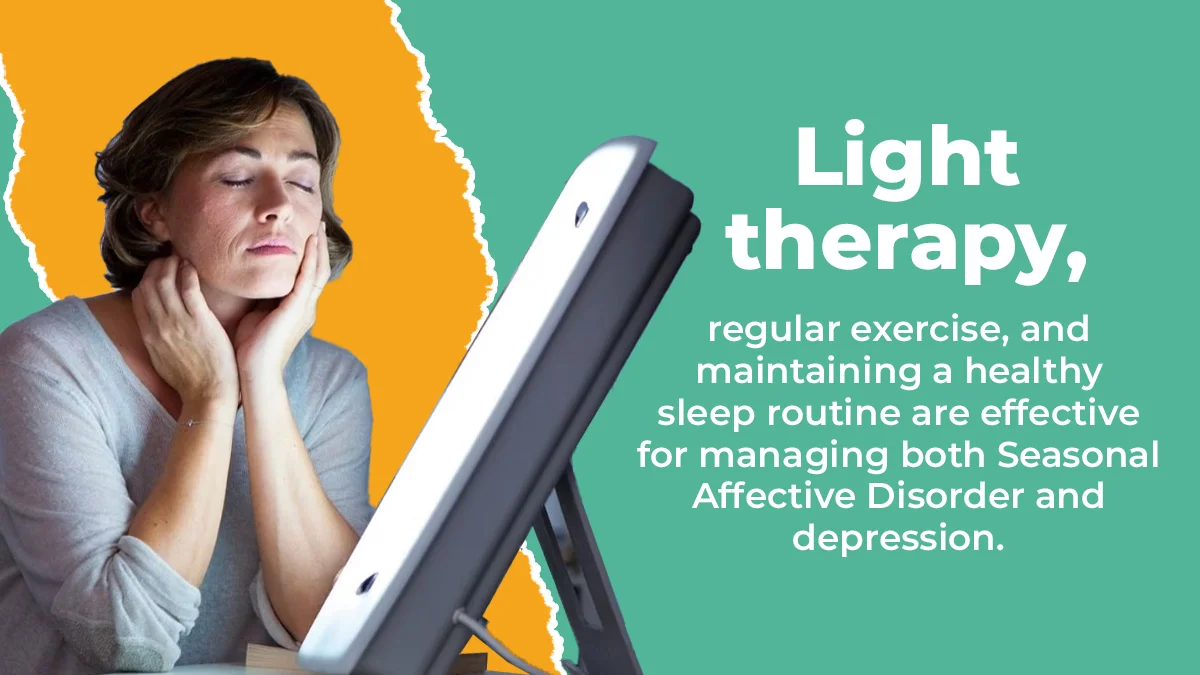
How Long Are Drug Rehab Programs: A Complete Guide
Explore how long drug rehab programs are with the complete guide from The Recovery Team-Newton.

As the seasons change, mental well-being can be affected by Seasonal Affective Disorder (SAD) and depression. Although they share similar symptoms, these conditions may differ in their triggers.
It is important to understand these disorders to provide effective intervention and offer hope in navigating the complexities of mental health throughout the year.
While SAD has its seasonal spotlight, depression is a year-round challenge that benefits from a holistic approach, blending professional help and self-care. Here’s what you need to know:
Contact The Recovery Team-Newton at (508) 978-2772 for more information and personalized mental health care to foster long-term healing and growth.
Seasonal affective disorder (SAD) is a subtype of major depressive disorder that follows a seasonal pattern, typically occurring in the late fall and winter months when there is less sunlight.
While SAD shares similarities with general depression, it is distinguished by its recurrent seasonal nature, impacting an individual’s mood and overall well-being.
Depression, a prevalent mental health condition affecting millions of adults in the United States, is characterized by persistent feelings of sadness, hopelessness, and a lack of interest or pleasure in daily activities.
This mood disorder can manifest in various forms, and SAD represents a specific type linked to the changing seasons.
SAD shares many similarities with major depressive disorder (MDD), the most common form of depression. Both conditions involve mood, energy, sleep patterns, and cognitive functioning disruptions. The key distinction lies in the temporal pattern of symptom onset.
While feelings of depression can occur at any time of the year, SAD is recurrent and typically follows a seasonal pattern.
Recognizing the signs and symptoms of Seasonal Affective Disorder is crucial for early intervention and effective treatment. Common symptoms of SAD include persistent sadness or despair, weight loss, irritability, daytime drowsiness, loss of interest in habits once enjoyed, changes in sleep patterns (oversleeping or insomnia), fatigue, difficulty concentrating, changes in appetite, and a general sense of heaviness or sluggishness.
The impact of seasonal affective disorder extends beyond emotional well-being, affecting various aspects of daily life. Individuals with SAD may experience difficulties in relationships, work, and academic performance.
The condition can lead to social withdrawal, decreased productivity, and an overall decline in the quality of life. Recognizing and addressing these challenges is crucial for managing SAD effectively.
Diagnosing Seasonal Affective Disorder involves a comprehensive evaluation by a mental health professional. A thorough assessment of symptoms, medical history, and the temporal pattern of symptom onset is crucial for an accurate diagnosis.
The Diagnostic and Statistical Manual of Mental Disorders (DSM-5) provides criteria for diagnosing SAD, ensuring consistency in clinical assessments.
Fortunately, various effective treatment options are available for Seasonal Affective Disorder, tailored to the individual’s needs and the severity of symptoms.
Here’s a list of common approaches and steps to treat depressive episodes:
Cognitive behavioral therapy (CBT) has proven effective in managing winter depression. This form of therapy helps individuals identify and change negative thought patterns, providing them with coping strategies to navigate the challenges associated with the winter and summer months.
In addition, engaging in regular CBT sessions can offer valuable support and guidance to manage conditions like bipolar disorder.
For some people, medication may be a necessary component of SAD treatment. Antidepressants, such as selective serotonin reuptake inhibitors (SSRIs), can help alleviate symptoms. However, it’s crucial to consult a healthcare provider or a doctor to determine the most appropriate medication and dosage based on individual needs.
Bright light therapy, or phototherapy, is a non-invasive treatment involving exposure to bright artificial light. This therapy aims to compensate for the reduced sunlight exposure during the darker months.
The special lamp, or light box emitting specific wavelengths of light, is used for a specified duration each day, usually in the morning. The light mimics natural sunlight, influencing circadian rhythms and neurotransmitter production, effectively reducing SAD symptoms.
Lifestyle changes can significantly alleviate depression in children and teens. Studies highlight the role of carbohydrates, emphasizing their positive impact on energy levels and mood. Adequate vitamin D, often prescribed by doctors, contributes to mental well-being.
Incorporating outdoor activities for kids and exposure to natural light can combat symptoms of depression. Lifestyle modifications cutting on illegal drugs can address major depression and diminish feelings of despair.
Discover a path to renewed joy and well-being with The Recovery Team-Newton.
Our day treatment program specializes in addressing the complexities of mental health challenges, providing a supportive environment for your recovery.
Moreover, if depressive symptoms and negative thoughts have led to substance abuse, our dual-diagnosis treatment program offers a tailored approach to guide you toward a healthier tomorrow.
Take the first step towards lasting change. Contact us at (508) 978-2772 today.

Explore how long drug rehab programs are with the complete guide from The Recovery Team-Newton.

How much does drug rehab cost without insurance? The Recovery Team-Newton explains financing options and resources.

Learn how to have fun without alcohol with the tips from The Recovery Team-Newton.
Seasonal affective disorder, recognized by the American Psychiatric Association, is a type of depression with a seasonal pattern. During late fall and winter, when there’s less sunlight, symptoms like low energy, social withdrawal, and mood changes may occur.
Chemical changes, including variations in melatonin, a sleep-related hormone, and serotonin levels, contribute to the condition.
Healthcare providers can help by assessing medical history and suggesting lifestyle changes, making it crucial to seek professional help for this mood disorder.
Both clinical depression and seasonal affective disorder (SAD) share common risk factors such as substance abuse, lack of sunlight, and negative thoughts.
SAD, which has a seasonal pattern, usually appears in late fall or winter, affecting mood due to shorter days. Effective treatments for SAD include bright light therapy, cognitive-behavioral therapy, and lifestyle changes.
On the other hand, clinical depression can occur at any time of the year and involves chemical changes in the brain and various risk factors. Both conditions may require professional help for effective management.